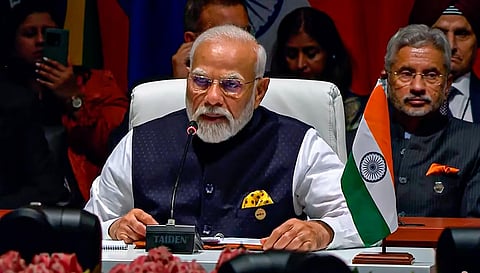

NEW DELHI: The upcoming BRICS summit in Rio de Janeiro is set to strongly denounce the recent terror attack in Pahalgam and back a unified, firm approach to combating terrorism, aligning closely with India's stance on the issue.
Prime Minister Narendra Modi will attend the summit on July 6 and 7, marking the beginning of India’s chairmanship of the bloc for the following year. The visit is part of his five-nation tour from July 2 to 9, which also includes Ghana, Trinidad and Tobago, Argentina, and Namibia.
Dammu Ravi, Secretary (Economic Relations) in External Affairs Ministry, emphasised the significance of Modi’s presence at the summit, describing it as “an expression of India’s solidarity with the bloc” and “a great opportunity for him to connect with the leaders of the Global South.”
Ravi said the BRICS leaders’ declaration will address terrorism in a manner that reflects India's expectations.
“There is no contradiction in the way the members have come out with their understanding, sympathy and solidarity with India on Pahalgam. I think this has been very well captured in the (leaders') declaration and all the members are very sensitive to this matter,” he said.
“There is also a broader understanding on how to deal with this menace of terrorism and no one should be spared in dealing with it. I think that is very well captured,” Ravi said.
“When you get the declaration, you will see the language is much to our satisfaction,” he said.
BRICS now includes 11 major emerging economies — Brazil, Russia, India, China, South Africa, Egypt, Ethiopia, Iran, the UAE, and Indonesia — representing approximately 49.5% of the world’s population, 40% of global GDP, and 26% of global trade.
The leaders’ declaration is also expected to reference the ongoing Iran-Israel conflict. Damu Ravi outlined four key deliverables from the summit: a framework on global governance and artificial intelligence, a declaration on climate finance, and a partnership to combat socially determined diseases.
He also suggested the bloc may discuss mechanisms for trade in national currencies. “Countries in the Global South are also looking at alternatives. It is not a de-dollarisation issue. Countries are also doing trade settlements in national currencies. This has been going on for quite some time,” he said.
“BRICS is bringing some understanding of how important it is to have alternative mechanisms to do trade and projects in national currencies,” Ravi said.